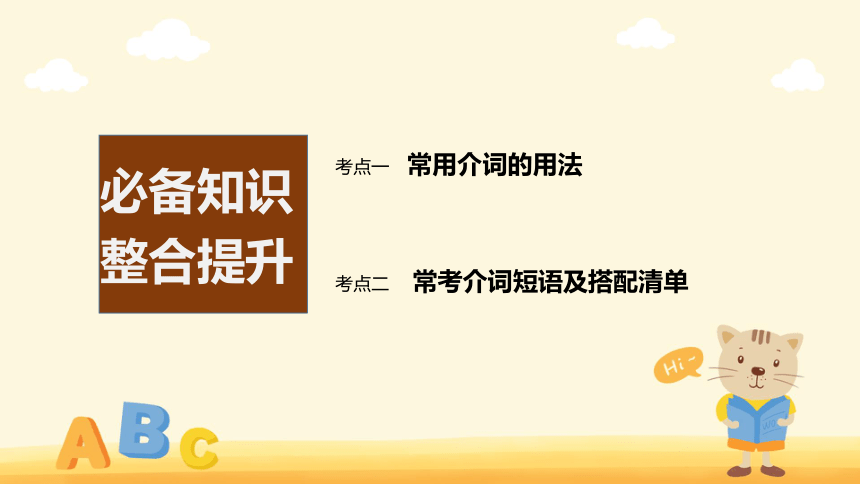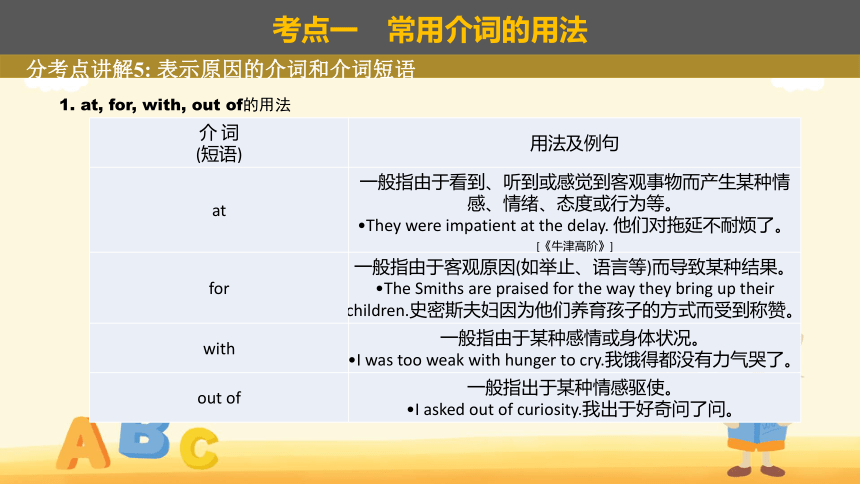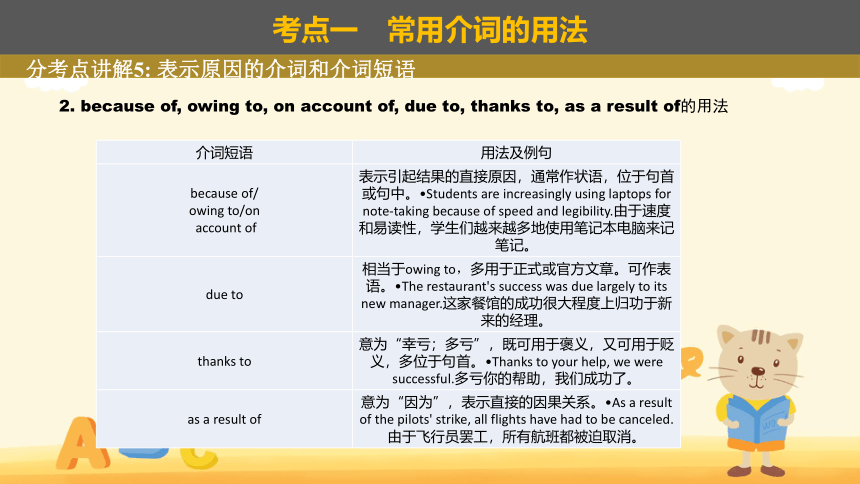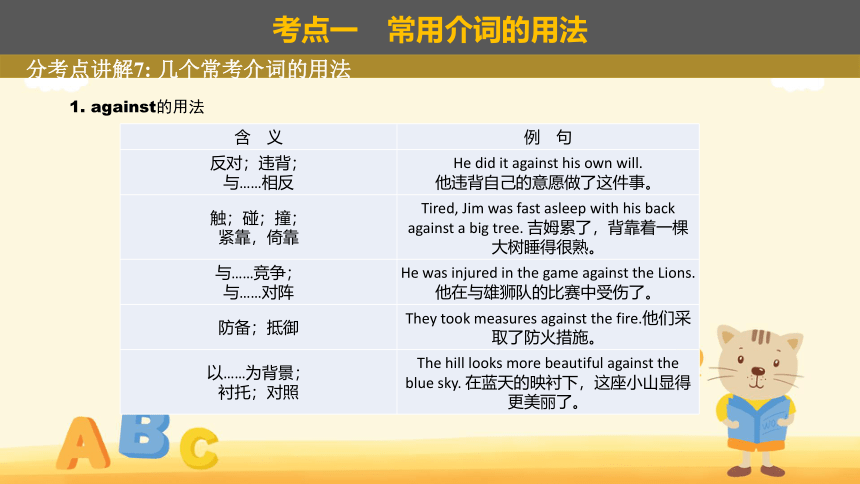2023年高考英语二轮专题复习:介词(2) 课件(16张PPT)
文档属性
| 名称 | 2023年高考英语二轮专题复习:介词(2) 课件(16张PPT) |  | |
| 格式 | pptx | ||
| 文件大小 | 298.9KB | ||
| 资源类型 | 教案 | ||
| 版本资源 | 通用版 | ||
| 科目 | 英语 | ||
| 更新时间 | 2022-10-27 14:54:21 | ||
图片预览







文档简介
(共16张PPT)
专题四 介词
第2讲 介词讲解(2)
必备知识 整合提升
核心考法 重难突破
易混知识 易错清单
介词
强化模拟 限时训练
必备知识
整合提升
考点一 常用介词的用法
考点二 常考介词短语及搭配清单
考点一 常用介词的用法
分考点讲解5: 表示原因的介词和介词短语
1. at, for, with, out of的用法
介 词 (短语) 用法及例句
at 一般指由于看到、听到或感觉到客观事物而产生某种情感、情绪、态度或行为等。
They were impatient at the delay. 他们对拖延不耐烦了。[《牛津高阶》]
for 一般指由于客观原因(如举止、语言等)而导致某种结果。
The Smiths are praised for the way they bring up their children.史密斯夫妇因为他们养育孩子的方式而受到称赞。
with 一般指由于某种感情或身体状况。
I was too weak with hunger to cry.我饿得都没有力气哭了。
out of 一般指出于某种情感驱使。
I asked out of curiosity.我出于好奇问了问。
考点一 常用介词的用法
分考点讲解5: 表示原因的介词和介词短语
2. because of, owing to, on account of, due to, thanks to, as a result of的用法
介词短语 用法及例句
because of/ owing to/on account of 表示引起结果的直接原因,通常作状语,位于句首或句中。 Students are increasingly using laptops for note taking because of speed and legibility.由于速度和易读性,学生们越来越多地使用笔记本电脑来记笔记。
due to 相当于owing to,多用于正式或官方文章。可作表语。 The restaurant's success was due largely to its new manager.这家餐馆的成功很大程度上归功于新来的经理。
thanks to 意为“幸亏;多亏”,既可用于褒义,又可用于贬义,多位于句首。 Thanks to your help, we were successful.多亏你的帮助,我们成功了。
as a result of 意为“因为”,表示直接的因果关系。 As a result of the pilots' strike, all flights have had to be canceled.由于飞行员罢工,所有航班都被迫取消。
考点一 常用介词的用法
分考点讲解6: 表示“关于”的介词
介 词 用法及例句
about 表示一般意义的“关于”。
He told me a lot about himself.
他给我讲了许多关于他自己的事情。
on 表示有关专业知识或理论的“关于”,比较有系统地或理论性较强地论述某事。
Nick, it's good for you to read some books on China before you start your trip there.
尼克,你在来中国旅行之前读一些关于中国的书对你有好处。
of 在与know, think, read, hear等动词连用时,of侧重于粗略涉及,而about涉及的情况则更为详细。
I have heard of him.
我听说过他。
考点一 常用介词的用法
分考点讲解7: 几个常考介词的用法
含 义 例 句
反对;违背; 与……相反 He did it against his own will.
他违背自己的意愿做了这件事。
触;碰;撞; 紧靠,倚靠 Tired, Jim was fast asleep with his back against a big tree. 吉姆累了,背靠着一棵大树睡得很熟。
与……竞争; 与……对阵 He was injured in the game against the Lions.他在与雄狮队的比赛中受伤了。
防备;抵御 They took measures against the fire.他们采取了防火措施。
以……为背景; 衬托;对照 The hill looks more beautiful against the blue sky. 在蓝天的映衬下,这座小山显得更美丽了。
1. against的用法
考点一 常用介词的用法
分考点讲解7: 几个常考介词的用法
2. at的用法
含义及用法 例 句
用在表示地点、场合、方位等的名词前,表示“在某处” I'll pick you up at the airport at 2 o'clock this afternoon.今天下午两点我会到机场接你。
用在表示时刻、钟点、期间、年龄等的名词前 He left school at (the age of) 16.他16岁便离开了学校。
表示“以,按(价格、速度、数量等)” Admission is at normal charges and you don't need to book.以正常价格收取门票费,你无须预约。
表示动作、感情的原因,意为“因……而;一听到/看到/想到……就……” We were frightened at the terrible sight.看到这可怕的景象,我们被吓到了。
表示“朝,向(某方向、目标)” He shot at the bird but missed it.他向那只鸟射击,但是没射中。
表示“在……方面” She's hopeless at managing people.她对人事管理一窍不通。
考点一 常用介词的用法
分考点讲解7: 几个常考介词的用法
3. beyond的用法
含 义 例 句
(指程度)深于;(指范围)越出;(指可能性、理解力、能力等)非……可及 The number of cities producing CO beyond the standard has been reduced from 40 to 9.
一氧化碳排放量超标的城市数量已经由40个减少为9个了。
(指空间)在……的那一边,在更远处 The airport is 20 miles beyond the town.
机场在离城镇二十英里外的地方。
(时间)晚于,迟于 He came home beyond the usual time.他比平时回家晚。
如果表达“(范围、程度)在……之内”,则用within。
The government was doing everything within its power to help the victims.
政府正尽其所能帮助受害者。
考点一 常用介词的用法
分考点讲解7: 几个常考介词的用法
4. by的用法
含义及用法 例 句
(时间)不迟于, 在……之前 He is sure to come by three o'clock.
他三点之前肯定会来。
(位置)靠近, 在……旁边/附近 On a cold evening, it is pleasant to sit by the fire.
在寒冷的傍晚,坐在炉火旁边很舒服。
(标准、度量、数量)根据,按照,以……计算;常用结构为“by + the + 单数可数名词” They sell eggs by the dozen.
他们按打卖鸡蛋。
We rent the car by the day.
我们按日租用汽车。
(程度、数量)相差 We lost the match by one goal.
我们以一球之差输了这场比赛。
经过,经由 They came in by the back door.
他们是从后门进来的。
靠,用,通过(某种方法、手段) You can reserve the tickets by phone.
你可以通过电话订票。
被……(常置于表被动的动词后,表示施动者) He was knocked down by a car.
他被一辆小汽车撞倒了。
考点一 常用介词的用法
分考点讲解7: 几个常考介词的用法
5. for的用法
含 义 例 句
(表示目的或功能)为了 Are you learning English for pleasure or for your work?
你学英语是出于消遣还是为了工作?[《牛津高阶》]
(表示对象或用途)给,对 The problem was that it was too valuable for everyday use. 问题是这对日常使用来说太贵了。
(表示原因)因为,由于 Campbell was arrested for dangerous driving.
坎贝尔因危险驾车被拘捕。
(表示时间、距离、数量)达,计 We drove for miles before we found a phone box.
我们开车数英里后才找到一个电话亭。
(表示等值或比例关系)换取 He agreed to pay 300 dollars for the picture.
他答应付300美元买下那幅画。
支持,赞成 How many people voted for the proposal?
有多少人支持这项提议?
至于,关于,就……而言 It's cold for the time of year.
就一年的这个时节而言,天气是冷了些。
(表示去向)往,向 A few days later she would be leaving for New York.
过几天她就要去纽约了。[《朗文当代》]
(表示陈述或问题的对象)对于 I'm sure she's the ideal person for the job.
我确信她是这个职位的理想人选。
考点一 常用介词的用法
分考点讲解7: 几个常考介词的用法
6. in的用法
含 义 例 句
(表示地点、场所、位置等)在……里面,在……内 The telephone was in the little study on the ground floor.电话在一楼的小书房里。
(表示时间)在……期间;在……之后 It will be ready in a week's time.
还需要一周时间就准备好了。
(表示某人或某物的状态、情况)处于……中 The engine appears to be in good condition.
引擎状态似乎很好。
关于;在……方面 The foods that you buy in hamburger restaurants are high in fat, sugar and salt.
你在汉堡店买的食物所含的脂肪、糖和盐的量都很高。
(表示服饰)穿着,戴着 He looked very handsome in his uniform.
他穿着制服看起来很英俊。
考点一 常用介词的用法
分考点讲解7: 几个常考介词的用法
7. on的用法
含 义 例 句
(表示接触或由某一表面支撑着)在……上 People were sunbathing on the grass.人们在草地上晒日光浴。[《朗文当代》]
(表示时间)在……时候 All patients are examined on admission to the hospital.所有病人入院时都要体检。
关于,有关 He will give a talk on the economic situation. 他将做一个关于经济形势的报告。
对着,朝 They are making an attack on the enemy.他们在向敌人发起攻击。
处于……(活动或状况)中 My girlfriend is often away on business trips.我的女朋友经常出差。
借助于,通过,以……方式 The information is available on the Internet.从因特网上可以得到这个信息。
考点一 常用介词的用法
分考点讲解7: 几个常考介词的用法
8. to的用法
含 义 例 句
(表示方向、距离)到,向,去 It was on the way to the railway station.
那是在去火车站的路上。
(离某件事或某个时间)还差……时间 He wakes at a quarter to six every morning.他每天早上5:45醒来。
(表示比较、比例、参照)与……相比,相对于……而言 That is why the fish prefer shallow water to deep water because the former is warmer.鱼喜欢浅水胜过深水是因为前者更温暖。
(表示对象关系)属于,对,给 The hospital is attached to the university.那家医院附属于这所大学。
达到(某一点或某个限度) Temperatures dropped to 25 degrees below zero.
气温降到了零下25度。
考点一 常用介词的用法
分考点讲解7: 几个常考介词的用法
9. under的用法
含 义 例 句
在……下面, 在……之下 She placed the ladder under the window.
她把梯子放到了窗户下面。
The dog squeezed under the gate and ran into the road.狗从门底下钻出去,跑到马路上去了。
在……的过程中 The possibility of employing more staff is still under discussion.
关于是否可以雇用更多员工的问题仍在讨论之中。
The hotel is still under construction.
旅馆还在修建中。
(数字、数量、年龄或价格)低于,少于,在……以下 These toys are not suitable for children under five.
这些玩具不适合五岁以下的儿童玩。
受……的影响 She's been under a lot of pressure at work.
她工作压力很大。
考点一 常用介词的用法
分考点讲解7: 几个常考介词的用法
10. with的用法
含 义 例 句
和……一起,和,同,跟 Would you like to go shopping with me?
你愿意和我一起去购物吗?
(表示同时或同一方向)随着 With time going by, the little tree has grown up.
随着时间的流逝,那棵小树已经长大了。
The shadows lengthened with the approach of sunset.随着太阳西沉,影子越来越长。
(表伴随)具有,带有 We saw Moore coming back with a drink in his hand. 我们看见穆尔回来了,手里拿着一杯饮料。
(指原因或理由)由于,因为 He trembled with fear.
他吓得发抖。
She blushed with embarrassment.
她难为情得脸红了。
(表示方式)用 He cut it with a knife.
他用刀把它切开。
(表示某人的行为方式或某事的发生方式) They fought with courage.
他们英勇地战斗。
A rocket exploded with a blinding flash.
随着一道炫目的闪光,一枚火箭爆炸了。[《朗文当代》]
专题四 介词
第2讲 介词讲解(2)
必备知识 整合提升
核心考法 重难突破
易混知识 易错清单
介词
强化模拟 限时训练
必备知识
整合提升
考点一 常用介词的用法
考点二 常考介词短语及搭配清单
考点一 常用介词的用法
分考点讲解5: 表示原因的介词和介词短语
1. at, for, with, out of的用法
介 词 (短语) 用法及例句
at 一般指由于看到、听到或感觉到客观事物而产生某种情感、情绪、态度或行为等。
They were impatient at the delay. 他们对拖延不耐烦了。[《牛津高阶》]
for 一般指由于客观原因(如举止、语言等)而导致某种结果。
The Smiths are praised for the way they bring up their children.史密斯夫妇因为他们养育孩子的方式而受到称赞。
with 一般指由于某种感情或身体状况。
I was too weak with hunger to cry.我饿得都没有力气哭了。
out of 一般指出于某种情感驱使。
I asked out of curiosity.我出于好奇问了问。
考点一 常用介词的用法
分考点讲解5: 表示原因的介词和介词短语
2. because of, owing to, on account of, due to, thanks to, as a result of的用法
介词短语 用法及例句
because of/ owing to/on account of 表示引起结果的直接原因,通常作状语,位于句首或句中。 Students are increasingly using laptops for note taking because of speed and legibility.由于速度和易读性,学生们越来越多地使用笔记本电脑来记笔记。
due to 相当于owing to,多用于正式或官方文章。可作表语。 The restaurant's success was due largely to its new manager.这家餐馆的成功很大程度上归功于新来的经理。
thanks to 意为“幸亏;多亏”,既可用于褒义,又可用于贬义,多位于句首。 Thanks to your help, we were successful.多亏你的帮助,我们成功了。
as a result of 意为“因为”,表示直接的因果关系。 As a result of the pilots' strike, all flights have had to be canceled.由于飞行员罢工,所有航班都被迫取消。
考点一 常用介词的用法
分考点讲解6: 表示“关于”的介词
介 词 用法及例句
about 表示一般意义的“关于”。
He told me a lot about himself.
他给我讲了许多关于他自己的事情。
on 表示有关专业知识或理论的“关于”,比较有系统地或理论性较强地论述某事。
Nick, it's good for you to read some books on China before you start your trip there.
尼克,你在来中国旅行之前读一些关于中国的书对你有好处。
of 在与know, think, read, hear等动词连用时,of侧重于粗略涉及,而about涉及的情况则更为详细。
I have heard of him.
我听说过他。
考点一 常用介词的用法
分考点讲解7: 几个常考介词的用法
含 义 例 句
反对;违背; 与……相反 He did it against his own will.
他违背自己的意愿做了这件事。
触;碰;撞; 紧靠,倚靠 Tired, Jim was fast asleep with his back against a big tree. 吉姆累了,背靠着一棵大树睡得很熟。
与……竞争; 与……对阵 He was injured in the game against the Lions.他在与雄狮队的比赛中受伤了。
防备;抵御 They took measures against the fire.他们采取了防火措施。
以……为背景; 衬托;对照 The hill looks more beautiful against the blue sky. 在蓝天的映衬下,这座小山显得更美丽了。
1. against的用法
考点一 常用介词的用法
分考点讲解7: 几个常考介词的用法
2. at的用法
含义及用法 例 句
用在表示地点、场合、方位等的名词前,表示“在某处” I'll pick you up at the airport at 2 o'clock this afternoon.今天下午两点我会到机场接你。
用在表示时刻、钟点、期间、年龄等的名词前 He left school at (the age of) 16.他16岁便离开了学校。
表示“以,按(价格、速度、数量等)” Admission is at normal charges and you don't need to book.以正常价格收取门票费,你无须预约。
表示动作、感情的原因,意为“因……而;一听到/看到/想到……就……” We were frightened at the terrible sight.看到这可怕的景象,我们被吓到了。
表示“朝,向(某方向、目标)” He shot at the bird but missed it.他向那只鸟射击,但是没射中。
表示“在……方面” She's hopeless at managing people.她对人事管理一窍不通。
考点一 常用介词的用法
分考点讲解7: 几个常考介词的用法
3. beyond的用法
含 义 例 句
(指程度)深于;(指范围)越出;(指可能性、理解力、能力等)非……可及 The number of cities producing CO beyond the standard has been reduced from 40 to 9.
一氧化碳排放量超标的城市数量已经由40个减少为9个了。
(指空间)在……的那一边,在更远处 The airport is 20 miles beyond the town.
机场在离城镇二十英里外的地方。
(时间)晚于,迟于 He came home beyond the usual time.他比平时回家晚。
如果表达“(范围、程度)在……之内”,则用within。
The government was doing everything within its power to help the victims.
政府正尽其所能帮助受害者。
考点一 常用介词的用法
分考点讲解7: 几个常考介词的用法
4. by的用法
含义及用法 例 句
(时间)不迟于, 在……之前 He is sure to come by three o'clock.
他三点之前肯定会来。
(位置)靠近, 在……旁边/附近 On a cold evening, it is pleasant to sit by the fire.
在寒冷的傍晚,坐在炉火旁边很舒服。
(标准、度量、数量)根据,按照,以……计算;常用结构为“by + the + 单数可数名词” They sell eggs by the dozen.
他们按打卖鸡蛋。
We rent the car by the day.
我们按日租用汽车。
(程度、数量)相差 We lost the match by one goal.
我们以一球之差输了这场比赛。
经过,经由 They came in by the back door.
他们是从后门进来的。
靠,用,通过(某种方法、手段) You can reserve the tickets by phone.
你可以通过电话订票。
被……(常置于表被动的动词后,表示施动者) He was knocked down by a car.
他被一辆小汽车撞倒了。
考点一 常用介词的用法
分考点讲解7: 几个常考介词的用法
5. for的用法
含 义 例 句
(表示目的或功能)为了 Are you learning English for pleasure or for your work?
你学英语是出于消遣还是为了工作?[《牛津高阶》]
(表示对象或用途)给,对 The problem was that it was too valuable for everyday use. 问题是这对日常使用来说太贵了。
(表示原因)因为,由于 Campbell was arrested for dangerous driving.
坎贝尔因危险驾车被拘捕。
(表示时间、距离、数量)达,计 We drove for miles before we found a phone box.
我们开车数英里后才找到一个电话亭。
(表示等值或比例关系)换取 He agreed to pay 300 dollars for the picture.
他答应付300美元买下那幅画。
支持,赞成 How many people voted for the proposal?
有多少人支持这项提议?
至于,关于,就……而言 It's cold for the time of year.
就一年的这个时节而言,天气是冷了些。
(表示去向)往,向 A few days later she would be leaving for New York.
过几天她就要去纽约了。[《朗文当代》]
(表示陈述或问题的对象)对于 I'm sure she's the ideal person for the job.
我确信她是这个职位的理想人选。
考点一 常用介词的用法
分考点讲解7: 几个常考介词的用法
6. in的用法
含 义 例 句
(表示地点、场所、位置等)在……里面,在……内 The telephone was in the little study on the ground floor.电话在一楼的小书房里。
(表示时间)在……期间;在……之后 It will be ready in a week's time.
还需要一周时间就准备好了。
(表示某人或某物的状态、情况)处于……中 The engine appears to be in good condition.
引擎状态似乎很好。
关于;在……方面 The foods that you buy in hamburger restaurants are high in fat, sugar and salt.
你在汉堡店买的食物所含的脂肪、糖和盐的量都很高。
(表示服饰)穿着,戴着 He looked very handsome in his uniform.
他穿着制服看起来很英俊。
考点一 常用介词的用法
分考点讲解7: 几个常考介词的用法
7. on的用法
含 义 例 句
(表示接触或由某一表面支撑着)在……上 People were sunbathing on the grass.人们在草地上晒日光浴。[《朗文当代》]
(表示时间)在……时候 All patients are examined on admission to the hospital.所有病人入院时都要体检。
关于,有关 He will give a talk on the economic situation. 他将做一个关于经济形势的报告。
对着,朝 They are making an attack on the enemy.他们在向敌人发起攻击。
处于……(活动或状况)中 My girlfriend is often away on business trips.我的女朋友经常出差。
借助于,通过,以……方式 The information is available on the Internet.从因特网上可以得到这个信息。
考点一 常用介词的用法
分考点讲解7: 几个常考介词的用法
8. to的用法
含 义 例 句
(表示方向、距离)到,向,去 It was on the way to the railway station.
那是在去火车站的路上。
(离某件事或某个时间)还差……时间 He wakes at a quarter to six every morning.他每天早上5:45醒来。
(表示比较、比例、参照)与……相比,相对于……而言 That is why the fish prefer shallow water to deep water because the former is warmer.鱼喜欢浅水胜过深水是因为前者更温暖。
(表示对象关系)属于,对,给 The hospital is attached to the university.那家医院附属于这所大学。
达到(某一点或某个限度) Temperatures dropped to 25 degrees below zero.
气温降到了零下25度。
考点一 常用介词的用法
分考点讲解7: 几个常考介词的用法
9. under的用法
含 义 例 句
在……下面, 在……之下 She placed the ladder under the window.
她把梯子放到了窗户下面。
The dog squeezed under the gate and ran into the road.狗从门底下钻出去,跑到马路上去了。
在……的过程中 The possibility of employing more staff is still under discussion.
关于是否可以雇用更多员工的问题仍在讨论之中。
The hotel is still under construction.
旅馆还在修建中。
(数字、数量、年龄或价格)低于,少于,在……以下 These toys are not suitable for children under five.
这些玩具不适合五岁以下的儿童玩。
受……的影响 She's been under a lot of pressure at work.
她工作压力很大。
考点一 常用介词的用法
分考点讲解7: 几个常考介词的用法
10. with的用法
含 义 例 句
和……一起,和,同,跟 Would you like to go shopping with me?
你愿意和我一起去购物吗?
(表示同时或同一方向)随着 With time going by, the little tree has grown up.
随着时间的流逝,那棵小树已经长大了。
The shadows lengthened with the approach of sunset.随着太阳西沉,影子越来越长。
(表伴随)具有,带有 We saw Moore coming back with a drink in his hand. 我们看见穆尔回来了,手里拿着一杯饮料。
(指原因或理由)由于,因为 He trembled with fear.
他吓得发抖。
She blushed with embarrassment.
她难为情得脸红了。
(表示方式)用 He cut it with a knife.
他用刀把它切开。
(表示某人的行为方式或某事的发生方式) They fought with courage.
他们英勇地战斗。
A rocket exploded with a blinding flash.
随着一道炫目的闪光,一枚火箭爆炸了。[《朗文当代》]
